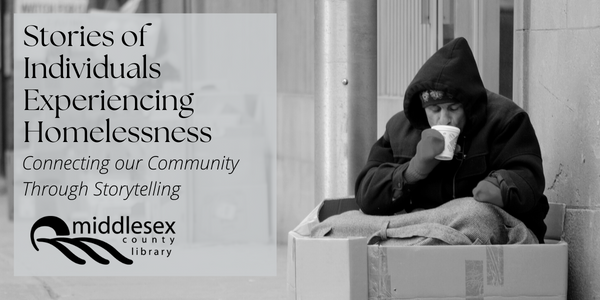
This project aims to use the power of storytelling to show the truth about homelessness.
Storytelling is a tool that can help communicate about issues like racism, classism, transphobia or homophobia. Hearing the stories of historically marginalized communities – whether it is residents facing homelessness, community members who identify as LGBTQ, Indigenous or a person of colour, or community members struggling with mental illness or addictions - can help others understand your experience and the personal strengths and connections you have made that supported you in overcoming challenges.
Through this storytelling project, we plan to share stories that speak to the importance of equity, diversity and inclusion. Stories can help bring people together, can build empathy and understanding; and can inspire prosocial action – whether that be supporting a local charity, helping someone in need, volunteering time or other actions that support members of our community.
The first phase of this project centers on homelessness. The first step in fighting homelessness is getting informed so that we can break down the stereotypes that divide us. Most people blame homelessness on the person experiencing it instead of the increasing shortage of affordable housing, lack of employment, a living wage or the countless reasons that put a person at risk. This lack of understanding creates a dangerous cycle of misperception that leads to the inability to effectively address the root causes of homelessness.
Through the summer of 2022, local residents experiencing homelessness were invited to share their story. The names in these stories have been changed to maintain anonymity.
Content Warning: These stories may be triggering to readers with similar experiences.
Do you know someone experiencing or at risk of homelessness?
For support around local housing, financial and food assistance programs and services, connect with our Community Navigator, Josh Smith, at 519-808-0588 or communitynavigator@middlesex.ca. This service is open to Middlesex County residents. There is no cost.
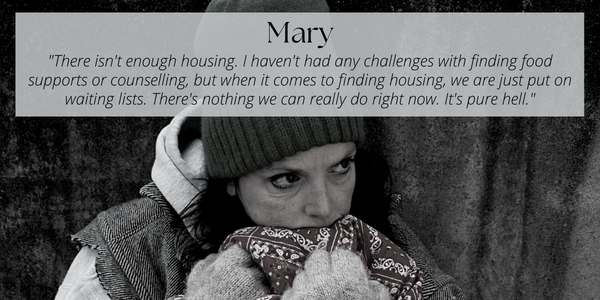
In August 2022, at the time of story recording, Mary was living in Middlesex County. Mary was previously a participant in the motel's emergency shelter program, however her funding has come to an end. Mary decided to remain living in the motel as her and her son had nowhere to go. This highlights the lack of available housing in the area, leaving people no choice but to pay the high cost of living in a motel.
Mary is sixty-five years old and is currently experiencing homelessness for the first time in her life. Mary is originally from Crediton, Ontario, a small town in South Huron, about a thirty-five-minute drive from Strathroy. Mary lived in Crediton most of her life until she experienced homelessness.
"I had been living with my brother in Crediton but then he put his house up for sale and I had to move. After that, I moved in with my daughter, but that was a toxic situation so I had to just get out of there."
Mary moved to Strathroy to be with her son. He too was experiencing homelessness. Together they were accepted into the emergency shelter motel program in Middlesex County at the end of March 2022.
Experiencing homelessness for the first time, Mary wasn't familiar with available support systems - she didn't even know where to begin. This made it incredibly challenging for her to be able to access all of the resources that could help her and her son through these difficult times.
Mary and her son's biggest struggle has been trying to find an affordable home. With limited affordable housing opportunities in the area, it is incredibly difficult to find a place that she and her son can afford. The wait time for acquiring affordable housing unfortunately can sometimes take years.
"There isn't enough housing. I haven't had any challenges with finding food supports or counselling, but when it comes to finding housing, we are just put on waiting lists. There's nothing we can really do right now. It's pure hell."
Mary expressed that her experience has been grueling but she credits the benefit of having her son to lean on as well as a close friend she has met at the hotel. Mary also expressed gratitude for the supports she has received at the emergency shelter motel program as they have eased some of the weight on her shoulders.
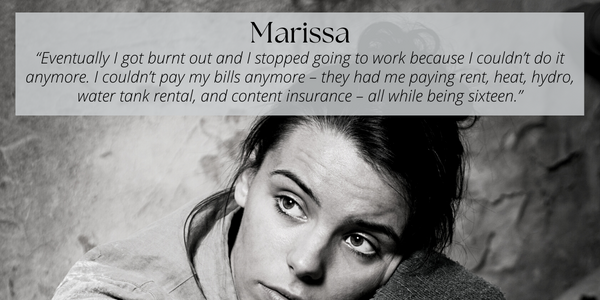 .
.In August 2022, at the time of the story recording, Marissa was a participant in the emergency shelter motel program in Middlesex County. Marissa is twenty-four years of age.
This is not the first time in Marissa's life that she has experienced homelessness. The first experience was when she was sixteen years old. She was living in Cochrane, a town in northeastern Ontario about an hour drive from Timmins.
Marissa had aspirations to be an actress. She wanted to go to art school but the school in her small town did not offer opportunities for her to pursue her dream. She had applied to some colleges for acting and was getting ready for student life.
"I had everything ready for an apartment, dishes and everything. Because every paycheck that I made working at Tim Hortons, I would go and buy stuff for an apartment when I would leave for college. So, eventually when I left, I would have everything and I wouldn't have to buy anything when I go to move out."
Marissa shares that her mother was struggling with severe mental health issues. Growing up, Marissa adds that she did not get along well with her younger brother which frustrated her mother. Marissa explains that one day her mother told her she was going to take her to a student residence in Sudbury, about a five-hour drive away from their home in Cochrane. She thinks she is going there to finish Grade 12 then return home. It was only after Marissa's mother dropped her off that she realized she was left at a homeless shelter. Marissa had nothing but a small suitcase and now was facing the harsh realities of homelessness.
"My mom basically dropped me off like a baby in a box with only a note. I was in complete shock when I found out. Once she dropped me off, she was gone. As soon as my mom got home, she packed up our house, sold everything and moved. Clearly she didn't want me going back home, and she definitely didn't tell me where she went."
Marissa lived in this shelter for around nine months. Being a child, Marissa was not able to apply to Ontario Works on her own. She needed a guarantor. The shelter staff had not faced this situation before but supported Marissa in applying for Ontario Works by acting as a guarantor.
From here, the shelter staff helped Marissa find an apartment. She stayed in this apartment for a year and a half. Being only sixteen-years old and living on her own, it was a huge adjustment for Marissa. After school each day, she would work an eight-hour shift at the local McDonald's. After a long bus ride, she would arrive home at 2 a.m. and then wake up the next day for school.
“Eventually I got burnt out and I stopped going to work because I couldn’t do it anymore. I couldn’t pay my bills anymore – they had me paying rent, heat, hydro, water tank rental, and content insurance – all while being sixteen. I had no idea what I was doing.”
Marissa lived in a few apartments but each time left because of concerns she had with her landlords and poor living conditions.
"I was telling my friend about how my landlord wouldn't fix things and how my apartment had bed bugs. He invited me to move into his home that had a one bedroom basement apartment. He said I could pay the same rent and use the Wi-Fi."
Things seemed to be turning around for Marissa. She was pregnant and felt thankful for her living conditions. Her friend was also a great help to her, supporting her and her fiancé in getting to medical appointments. Until one day her friend unexpectedly passed away. Marissa soon finds out that her friend's ex-girlfriend had her name on the home as well and the house came into her possession. Marissa was served a no-fault eviction notice. This was a week after giving birth.
A friend offered some shelter in his home in Albin, a small town near Parry Sound.
"It's right off the highway, where there's nothing around, no stores nearby to get to. After arriving, we find out that the water wasn't drinkable. My fiancé had to quit his job because of the move, which meant we had no money to buy clean water. So, for a time we had to drink the tap water and we all got horribly sick with a bacterial infection. Even after my fiancé was able to get a job, it was still a forty-five minute drive to get clean water."
Soon after settling into Albin, Marissa began to struggle with post-partum depression due to the seclusion and isolation of her town.
"My fiancé worked all day and I had no one to talk to. I was very sad."
Suddenly, Marissa was facing homelessness once again. Her friend lost her home and she needed to relocate. Marissa frantically called around to everyone she knew, and the only person willing to take her, her fiancé, and newborn in was her uncle in Strathroy.
"My uncle allowed us to stay at his place for about two months until he realized that the children's aid would be meeting with them at his house every week. Unfortunately, this did not fly well with him, and he decided to kick us out."
Marissa, her fiancé, and their newborn child were accepted into the emergency shelter motel program in Middlesex County in July 2022.
Marissa is a Personal Support Worker on maternity leave and her fiancé is working a three-year contract position in the area. For Marissa, finding an affordable rental or home has not been hindered by lack of income - it is the credit checks that are used to determine suitability.
"When I first experienced homelessness, I racked up a lot of debt. I was a sixteen-year old with a credit card. I didn't know how to responsibly use it. Now my credit isn't good."
Marissa was asked what she would like people to know about homelessness and what she hopes will change as a result of others hearing her story.
"I want to say that homelessness isn't dirty or gross, and we're not disgusting. People from anywhere and any financial status can become homeless in a heartbeat. I want people to know it is not just drug addicts and drunk people. Life goes up and down, it's crazy sometimes, and you just can't always control what happens. I couldn't control my mother kicking me out; there's nothing I can do about that now. I'm just trying to find somewhere for me and my child to live."
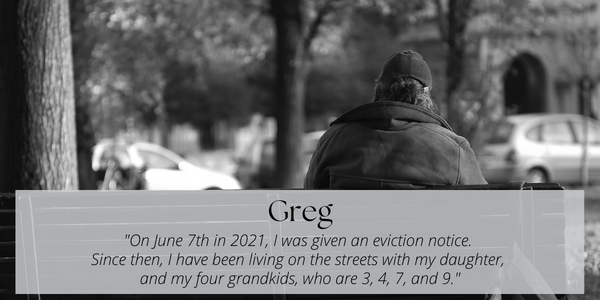
In August 2022, at the time of the story recording, Greg was living in a motel in Middlesex County for around seven months. Greg was previously a participant in the motel's emergency shelter program; however, his funding came to an end. Greg decided to remain living in the motel as he and his family had nowhere else to go. This highlights the lack of available housing in the area, leaving people with no choice but to pay the high cost of living in a motel.
In March of 2021, Greg was scheduled for a virtual hearing with his landlord. However, Greg was not made aware of the fact that the hearing was scheduled virtually. He thought it was in-person. This unfortunately resulted in Greg missing the hearing and his opportunity to present evidence in support of his case.
"On June 7th in 2021, I was given an eviction notice. Since then, I have been living on the streets with my daughter, and my four grandkids, who are 3, 4, 7, and 9."
After Greg was evicted from his rental in Strathroy, he and his family lived on the side of the Thames river in tents for two months. But Greg knew this couldn't be a permanent living situation in the winter months. A friend of Greg's offered him an old trailer to use.
"I knew winter was coming and wanted something more closed up for the children."
Greg did some work on the trailer, added a portable heater and laid a tarp over the top for extra warmth for his family during the winter. He also added a fence so that his grandchildren could have a safe place to play outside of the trailer. He was fortunate to have the knowledge and skills to modify the trailer to support all-season living conditions.
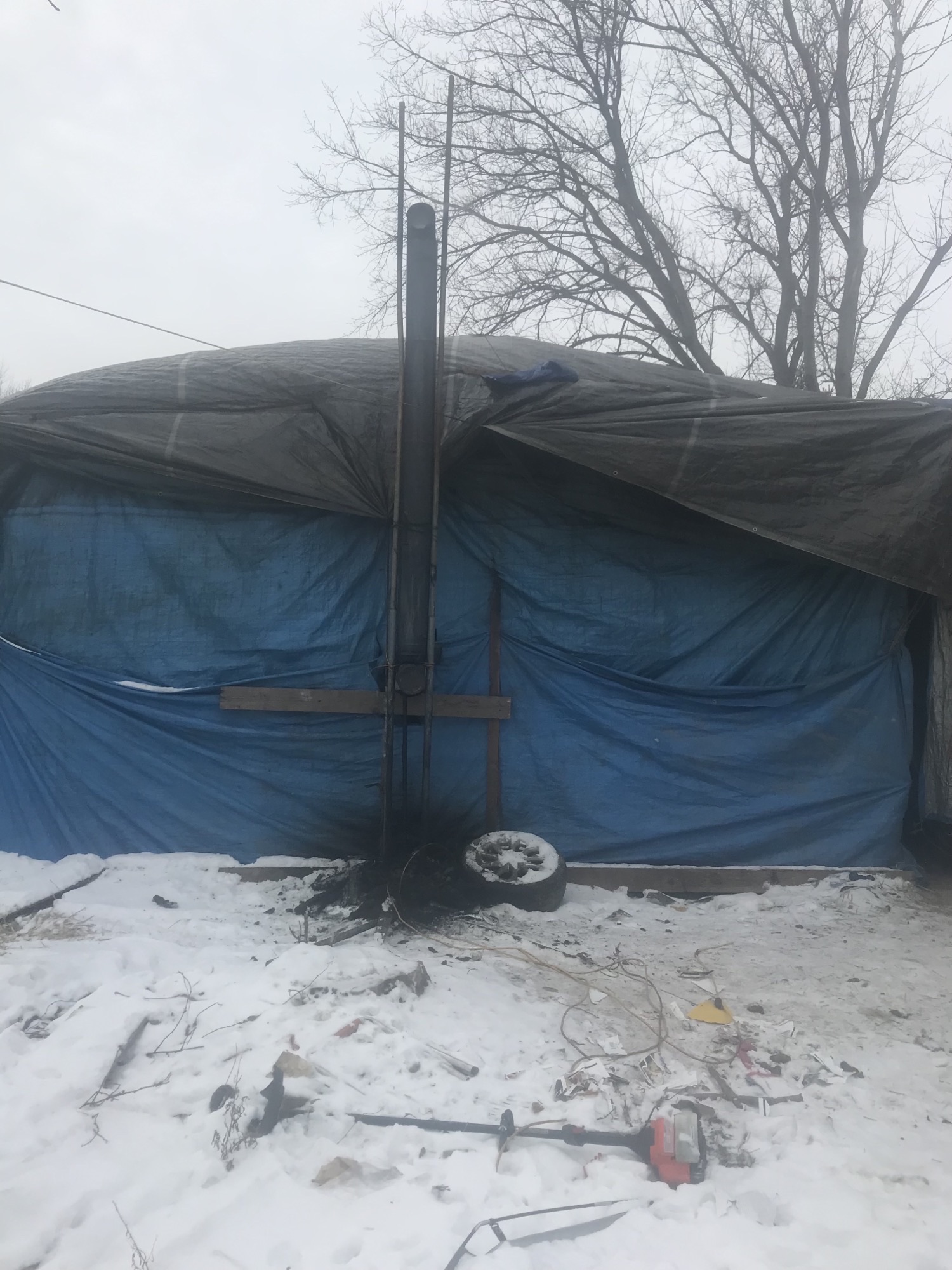
"The reserve we were living on told us we needed to leave. I was able to get us into a motel in Chatham, but we were only able to live there for a week and a half. That was when we moved back to Strathroy and into this motel."
It is challenging to experience homelessness as a single individual, but Greg's situation is even more complicated - he has his daughter and his four grandchildren to support. This increases his overall expenses and makes it more difficult to find a rental that can support a family of this size. The other major challenge that Greg has faced is that his social assistance payment has not increased over the years. Inflation has increased the price of groceries, rent, gas, and more.
Greg has also had to deal with added expenses related to moving into the motel. For example, he is paying for a storage locker where most of his furniture is being stored. Also, as Greg is not a resident of Strathroy, he has to pay for a mailbox at the post office in order to receive his mail. Experiencing homelessness can be expensive. It can be very challenging to save money to afford a rental - continuing the cycle of poverty.
Greg cares deeply for his grandchildren and their struggles with homelessness adds an incredible amount of pressure on him as he wants to care for them as best he can.
"My experience has mostly been looking after the kids and making sure they are fed and have everything they need. I've tried to get them into school but they can't go to school unless they're collecting taxes from where you are residing - which they are not. Trying to do school online has also been a struggle because it's hard to have Wi-Fi when you're homeless."
Even though Greg is Indigenous and has a status card, he cannot access the local supports because they are not within his band. His own band lost their land some time ago. He feels supports for individuals experiencing homelessness are lacking.
"I haven't heard anything from (affordable) housing and I've been on it for seven years now. I've been on emergency housing for a year-and-a-half but I still haven't heard anything, which is frustrating. To make matters worse, most of the temporary (affordable) housing situations here are only for two or three months. It wouldn't make sense for me to take all of my stuff out of a storage unit that I have a good deal on. It's not cheap being homeless, everyone thinks we can just walk away from stuff, but you can't when you have responsibilities."
When asked about what he hopes will change as the result of sharing his story, Greg replied:
"I hope the government stops avoiding the issue of homelessness and actually does something about it. We cannot afford down payments on houses, let alone rent. They need to find a solution."
Greg's most important goal throughout all of this experience has been keeping the family together. When asked what he thought has helped him get through it all, this was Greg's response:
"My grandkids are my rock. After I came to Strathroy, I ended up in the hospital in a five-day coma. The only thing that kept me going was my grandkidsand that I have them to come back to. That's about everything to me."
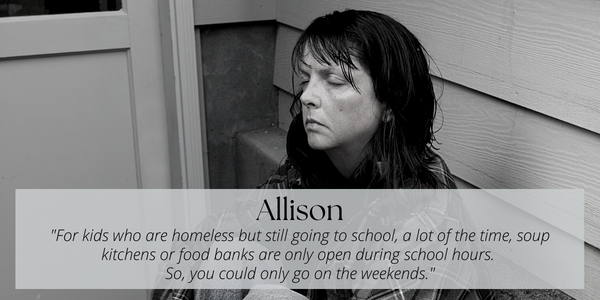
In August 2022, at the time of the story recording, Allison was a participant in the emergency shelter motel program in Middlesex County. Allison is twenty-five years of age.
Allison experienced homelessness on and off as a youth, beginning at the age of fifteen-years old. Allison shares that the major contributor to her experiencing homelessness was the abuse she faced by her family.
"I wish that when I was younger I could've gotten into housing or had counselling support for the abuse that I went through. I think I'd probably be doing a lot better right now if I'd had those things. Since I couldn't get out of the abuse safely, it literally led to me being homeless."
As a youth, Allison was living in Lambton County. When asked about what it was like accessing resources for youth experiencing homelessness, Allison replied:
"It was difficult to get Ontario Works and it was difficult to get a place to live."
Unfortunately, for many youth, especially between the ages of sixteen to eighteen, it is even more of a struggle being homeless. For Allison, she was 'too old' to access Children's Aid Society services as the majority of their supportive services only go up to sixteen years of age. She was 'too young' to access adult services for people facing abuse or violence as the majority of these supportive services start at eighteen years of age. If a youth is under eighteen years of age, when applying for Ontario Works, they need to meet a number of additional requirements in order to qualify, which includes having a trustee attached to the file.
This can be a barrier for youth under eighteen years of age, limiting a source of funding for food, shelter, and other essential needs. As well, accessing emergency food services can be a challenge.
"For kids who are homeless but still going to school, a lot of the time, soup kitchens or food banks are only open during school hours. So, you could only go on the weekends."
Due to the additional requirements and difficulty securing a trustee to be eligible for Ontario Works, many youth are placed in a position where they need to return to unsafe living conditions as they are unable to secure financial supports. For Allison, this unfortunately was the situation she faced.
"I would be at the shelter for a few weeks, and then I would have to sofa surf. Eventually though, I had to go back to my family because I couldn't get any of the benefits back then."
At age 19, Allison attended college for business and general arts. But after college, Allison was once again experiencing homelessness.
"I ended up going back to the same people who abused me because I was used to it as a younger person, used to being forced to go back... it had become a habit."
Allison shares that after a night facing abuse at home, she left and made her way to Middlesex County and was accepted into the emergency shelter motel program.
"It hasn't been that bad, at least I have an actual shelter here at the motel. It's not like being so homeless that I'm staying under a flight of stairs somewhere and having to go to Walmart to get water from a water bottle. Or even living off of just beef jerky which is not fun. You only get one package of jerky and you have to make that last for a week, so you really only get one or two pieces a day."
Allison credits the friendships she has made over the years for helping her experience more manageable. She also recognizes that her work researching and understanding what resources and supports are available in the area, helped her survive her experience.
When Allison was asked what she wants people to understand about homelessness, this was her response:
"The state of homelessness has been a problem for years and it has gotten progressively worse with the pandemic, like people have lost their businesses, people have lost their jobs, and sometimes they cannot get back into that industry."
Allison adds:
"Being homeless affects everyone; it's very diverse. You can have people who had a business become homeless, you can have doctors or veterinarians; it's not just bums and it's not just drug addicts. There are people who through no fault of their own, have become homeless. I want people to understand that it's not all about being lazy or not trying, it's the fact that sometimes people have bumps in the road and it's hard to recover from them."
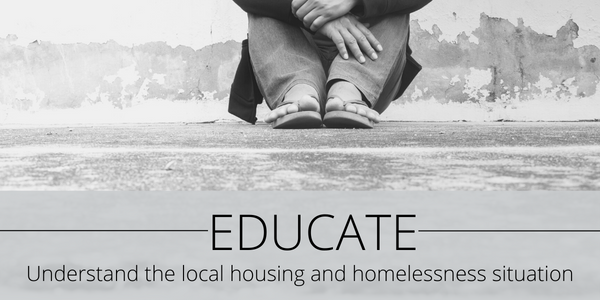
To help illustrate the housing and homelessness situation in Middlesex County, we ask that you considering the following:
Housing is a key social determinant of health and essential to finding and maintaining a job, yet finding a place to live in Ontario is a struggle for many due to low vacancy rates, limited supply, and an insufficient mix of housing options.
Homelessness can encompass a range of circumstances, including:
Sources:
Advocacy Centre for Tenants Ontario, Homelessness in Canada and Ontario
Association of Municipalities of Ontario
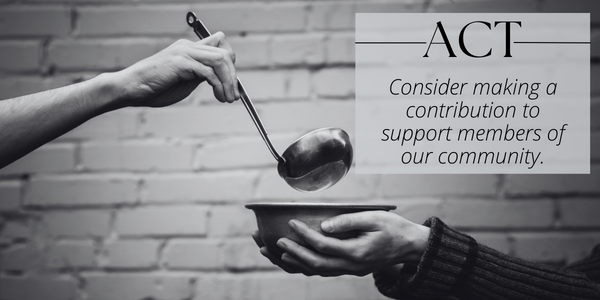
If you wish to provide some support to local residents who are at risk of homelessness or experiencing homelessness, consider donating to a local food or financial assistance program. Here are some local programs to consider:
Food Banks
Salvation Army Family Services Centre - Strathroy
Mt Brydges Caring Cupboard Food Bank
Clothing Shops
St. Vincent de Paul Economy Store - Glencoe
